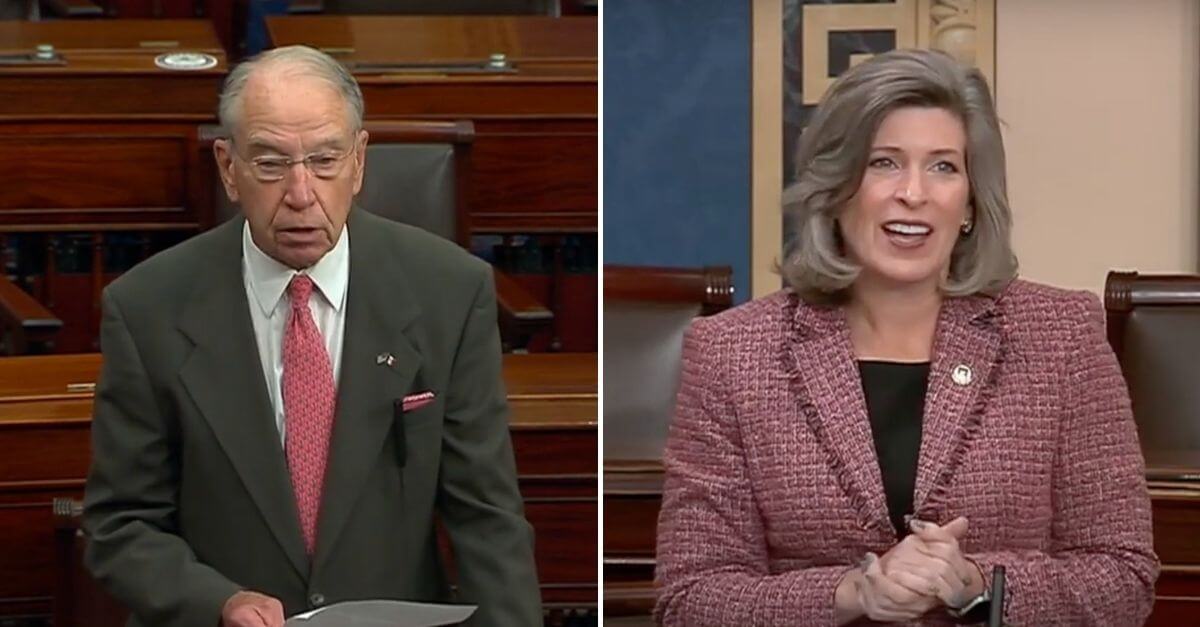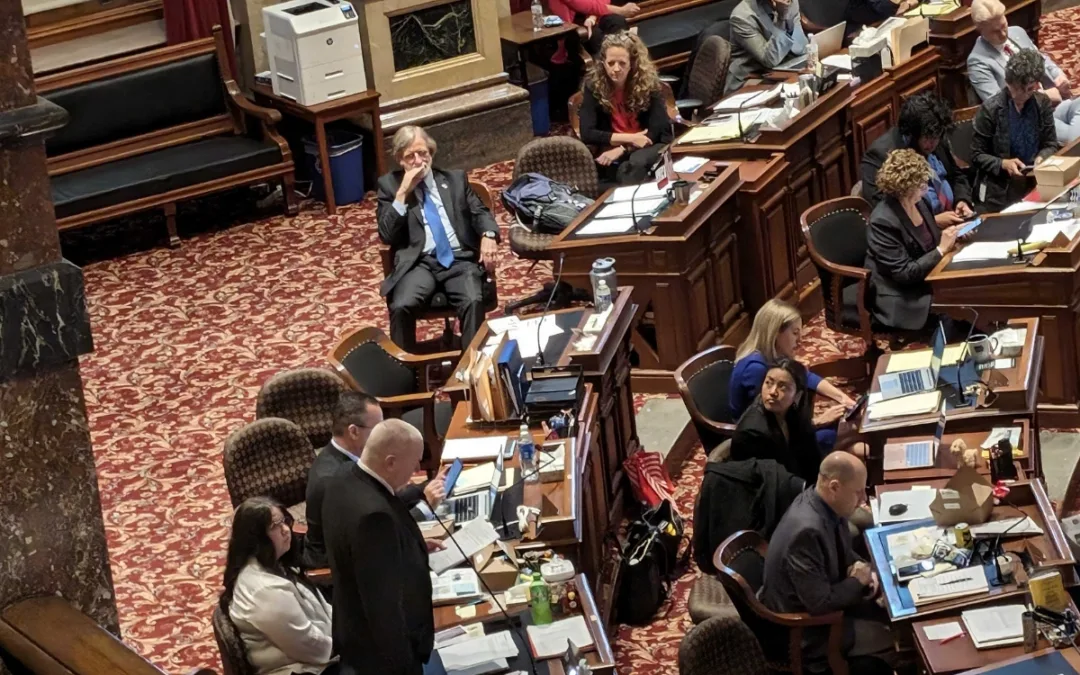
As they’ve been signaling for weeks, Iowa Sens. Chuck Grassley and Joni Ernst voted against a bill that would improve America’s election laws.
The For the People Act (S. 1), came up for a vote to open debate in the Senate last night with no Republican support, despite concern for election integrity across the country. But Iowa’s Republican delegation didn’t support this attempt at reforming election laws. Instead, they spent time spreading lies or misleading information about the bill.
Yesterday morning, Grassley tweeted a misrepresentation of the law, saying it would register undocumented immigrants and that Democratic politicians have decided to do away with state election laws after 240 years of state-run laws.
S 1 is 800 pg bill After 240yrs of state legis writing voting law Democrats now come 2the conclusion that we should do away w all state election law & hv 1 federal law BAD IDEA eliminates voter ID gives ur money to politicians 4 campaign ads Registers illegal immigrants 2vote etc
— Chuck Grassley (@ChuckGrassley) June 22, 2021
But the For the People Act doesn’t register undocumented immigrants, and it can’t. The law creates automatic voter registration for eligible citizens, done through information provided to the Department of Motor Vehicles. Undocumented immigrants aren’t eligible citizens.
[inline-ad id=”4″]
Former Congresswoman Abby Finkenauer debunked more of Grassley’s tweets opposing the For the People Act on false grounds.
He is lying. It’s a federal crime to register an ineligible voter. His BS claim here has already been debunked. S1 stops gerrymandering dividing our politics, stops DARK MONEY & protects our right to vote. He doesn’t have to like saving democracy, but doesn’t get to lie about it. https://t.co/B84XetHTeI
— Abby Finkenauer (@Abby4Iowa) June 22, 2021
Also yesterday, Ernst tweeted a video of herself where she criticized the For the People Act and exaggerated what a few parts would do, while leaving out the benefits in many other parts.
“I have a special interest in this,” she said. “I served as the Montgomery County auditor in Iowa and in Iowa our county auditors are the commissioners of elections, and I fully believe that our state and local officials are the ones that should be running our election systems, not our federal government.”
[inline-ad id=”5″]
Her complaints were related to the Federal Election Commission, ballot collection, campaign finance and the prohibition of voter ID laws.
The For the People Act reforms the structure of the FEC, the federal agency that enforces and administers election law. The bill would make the number of members five, in order to eliminate ties, and require a nonpartisan board to seek out and recommend members. It also calls for no more than two people of a single party be on the commission.
The bill also permits voters to designate a person to return their sealed absentee ballot, as long as that person isn’t paid to do so. Politifact notes that many states already allow that, though some have different restrictions. Iowa outlawed that in most cases with a new voting restriction law implemented this year.
Ernst also pointed toward a small provision in the bill to introduce a public financing system for campaigns that would encourage more small-level donors and push out some of the influence of big donors. Ernst didn’t mention how the bill will address the connection between political action committees and campaigns, or that taxpayers contribute voluntarily.
[inline-ad id=”1″]
The Campaign Legal Center reported in January, “This would make elected officials more responsive to the broad base of community members funding their campaigns rather than a handful of wealthy special interests.”
Lastly, Ernst said the For the People Act would prohibit voter ID laws. It won’t.
The For the People Act mandates that states with voter ID laws allow people without an approved ID to sign a sworn written statement to vote in federal elections. It also expands the types of IDs voters can present at the polls. In this way, the For the People Act confirms existing Iowa law that also allows for multiple types of ID.
The For the People Act also:
- Requires all voters receive an absentee ballot application
- Requires states provide more than one ballot drop box per county, calling for a “sufficient number of secure, accessible and widely distributed drop-boxes for completed absentee ballots starting at least 45 days before the election”
- Ends gerrymandering, moving for states to adopt independent redistricting systems more like Iowa’s
- Among other provisions
The Campaign Legal Center found that the For the People Act contains several policies supported by officials in red states or backed by Congressional Republicans. During a committee debate in the Senate, the committee adopted some Republican amendments.
[inline-ad id=”0″]
Another claim made by both senators is that this law is meant to federalize elections. That isn’t true either.
Because of specific language in the Constitution and decisions in multiple Supreme Court cases, Congress already has a lot of authority over elections. In 2019, Chief Justice John Roberts said the For the People Act is a sound example of Congress’ authority over election laws.
All the For the People Act does is set new standards for states to meet. And it only applies to federal elections.
by Nikoel Hytrek
Posted 6/23/21
[inline-ad id=”2″]
Politics

AEAs cutting workers in wake of Republican legislation
Iowa legislators said a new bill cutting money for agencies that help students with disabilities wouldn't affect services. But area education...

He said what? 10 things to know about RFK Jr.
The Kennedy family has long been considered “Democratic royalty.” But Robert F. Kennedy, Jr.—son of Robert F. Kennedy, who was assassinated while...
Local News

No more Kum & Go? New owner Maverik of Utah retiring famous brand
Will Kum & Go have come and gone by next year? One new report claims that's the plan by the store's new owners. The Iowa-based convenience store...

Here’s a recap of the biggest headlines Iowa celebs made In 2023
For these famous Iowans, 2023 was a year of controversy, career highlights, and full-circle moments. Here’s how 2023 went for the following Iowans:...





